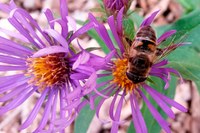Eason Research Lab
 Research in the Eason lab focuses broadly on animal ecology. We have particular interest in field-based research, and we address both questions of theoretical interest and questions related to animal conservation.
Research in the Eason lab focuses broadly on animal ecology. We have particular interest in field-based research, and we address both questions of theoretical interest and questions related to animal conservation.
In our recent field work in animal ecology we have examined how boundaries affect territorial behavior in Nicaraguan cichlid fishes and used stable isotopes to determine how individual specialization in Kentucky frogs and toads may influence species co-existence and competition. We have also investigated how nest-site selection in little terns is affected by island size and shape, and how crab spiders select their foraging sites. Currently, we are examining how flight trajectory in grey squirrels is affected by refuges and predator approach.
In our recent work in conservation we have examined the effects of urbanized environments on dragonfly species richness and on foraging and habitat use in white-footed mice. We have also identified factors that predict the conservation status of North American dragonflies and damselflies, and we used individual identification software to assess cave salamander populations. Currently, we are assessing the potential of urban gardens as conservation space for insects and documenting the flexibility of vocal repertoire and behavior in the toque macaque, a globally endangered species endemic to Sri Lanka.
Read: A Living Lab: Biology Department’s Native Plant Garden in full bloom

